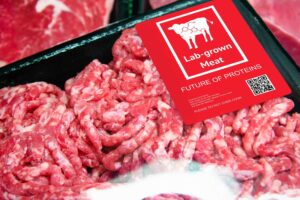Scientists Create Meat From Human Cells, But Claim It’s Not Cannibalism
Scientists recently introduced an audacious concept: a ‘grow your own steak kit’ using human cells and blood, titled the Ouroboros Steak. This idea, more of an art piece than a practical solution, pushes the boundaries of our comfort zones and challenges the ethics and practices within the cultured meat industry. Displayed at the prestigious Beazley Designs of the Year exhibition in London, this provocative piece is aimed at sparking discussions about the future of meat consumption.
“Cooking is all about people. Food is maybe the only universal thing that really has the power to bring everyone together. No matter what culture, everywhere around the world, people get together to eat”, Guy Fieri#cultivatedmeat #cleanmeat #kitchentissueengineering pic.twitter.com/R0gdC5jkJ5
— ourochef (@ourochef) October 18, 2019
The Cultural Statement of Lab-grown Meat
Developed by a team of American scientists, the Ouroboros Steak offers a glimpse into what meat made from human cells might look like. Despite its edgy premise, it’s not designed for actual consumption. Instead, it is an avant-garde statement against the use of fetal bovine serum (FBS) – a protein-rich growth liquid derived from calf fetuses often sourced when pregnant cows are slaughtered in the meat industry. Andrew Pelling, one of the scientists behind the project, voiced concerns regarding FBS, emphasizing its cost both in financial terms and in animal lives.
A Growing Market, Yet Uncharted Territory
While lab-grown meat is yet to receive approval for commercial sale, its potential is undeniable. The market is projected to be worth a staggering $572 million by 2025, up from $206 million. The process envisioned for the Ouroboros Steak DIY kit is simple: Individuals could collect their cheek cells using a cotton swab and deposit them onto mushroom mycelium scaffolds. After nurturing them in a controlled environment and feeding them human serum, in three months, a steak could, theoretically, be ready for consumption.
Grace Knight, the industrial designer on the project, emphasizes the sustainability of using human blood over FBS. Moreover, she clarifies that the concept isn’t technically cannibalism, as it challenges the societal norms and perceptions associated with consuming one’s own cells.
The Environmental Implication of Cultured Meat
Cultured, or lab-grown meat, has been heralded as a revolution in the food industry. Its potential to reduce animal suffering and offer a more environmentally friendly alternative to traditional meat production methods has garnered significant attention. The Ouroboros Steak, with its roots in this industry, takes this a step further, offering a critique on the environmental arguments presented by the broader cell-based meat sector.
The reliance on FBS has been a contentious issue within the cultured meat community. Critics argue that this practice undermines the industry’s claims of being a sustainable and ethical alternative. However, a study from Frontiers suggests that lab-grown meat could indeed be more climate-friendly, although comprehensive research is still ongoing.
Your Meat, Your Choice
The introduction of the DIY steak kit concept is not merely about presenting a new source of protein; it’s a poignant commentary on self-sustainability and ethics. If the kit becomes a reality, individuals could know the exact origins of their meat, ensuring it’s ethically sourced and cultivated.
However, the underlying question remains: Even if it’s not technically cannibalism, would you be comfortable eating meat cultivated from your own cells? Knight argues that using human blood is not just sustainable but also economical. In a world grappling with food security and sustainability, such radical ideas may pave the way for innovative solutions.
The Road Ahead
The Ouroboros Steak, while polarizing, serves as a testament to the lengths scientists and designers are willing to go to challenge the status quo. While lab-grown meats are yet to grace our plates, they’ve already ignited conversations about the future of food. In a world where sustainability is paramount, it’s essential to look beyond traditional methods and explore all possibilities, even if they take us out of our comfort zone.
In conclusion, while the Ouroboros Steak might not be on everyone’s dinner menu anytime soon, its existence poses crucial questions about sustainability, ethics, and the lengths we might have to go to ensure a food-secure future.













